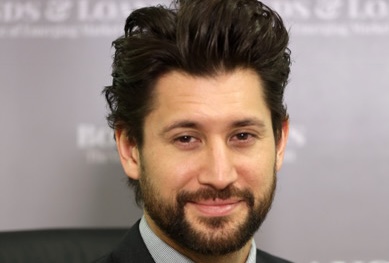Alex Johnson is CEO of Turnmill, the holding company for the UK-based GFC Media Group, which he co-founded with Piers Bearne almost 15 years ago. He had previously organised events for Euromoney. GFC was launched in 2009 with £200k of investment from friends and family.
The company organises annual marketplaces for the capital financial markets in Dubai, Cape Town, Istanbul, Riyadh and Miami. Dubai accounts for some 35% of revenue but Cape Town is not far behind. Some 75% of revenue comes from ads, sponsorship and meeting packages, the rest from delegates.
This year, Horizon Capital (which had previously backed AgriBriefing) acquired a c65% shareholding, valuing GFC at an estimated £30mn. Turnmill recently made its first acquisition, paying an estimated £3-4mn for the £2mn-revenue Completely Retail.
Johnson graduated in economics from Durham University, in the UK.

What is GFC Events?
We bring together the global banking and capital markets industry: sovereign funds, corporates, and financial institutions who are looking to raise capital together with bankers, advisors, and investors. We started as a conference business. I learned my trade at Euromoney, which was always about looking at high-quality attendees, and speakers, capturing about 100 people who are all there to learn. It’s about thought leadership. But what you don’t get is the quality of earnings and the repetition in terms of sponsorship because a topic is hot one year and not the next. So, I had an idea of developing a subject that we can get behind. We started as a conference business that was looking to expand into a Confex business, and we did that for about 10 years. We had banks that were sponsoring with booths and there were meetings too. So, at our peak just before before COVID, we would have 1,000 people attending our events, but probably 250 people were spending most of their time in the conference-room listening to speakers, and about 700-800 were spending most of their time outside networking and developing business. That got us thinking.
How’s it changed?
If I take you right back to the beginning, during the credit crisis and when I was at Euromoney, I noticed a change in the way in which the banks were operating. Because there was less money and less growth, a lot of the companies were looking to move their loan portfolios into bonds, to try and get longer-dated funding. Consequently, the bond and loan bankers were working much more closely together than ever before. So, I had this idea of bringing together the people who, for example, would have attended Euromoney’s separate bond and loan conferences into a much broader debt markets event, keeping the high-quality content and the best elements of the conference, but trying to bring in a wider opportunity for networking and business development.
That’s what we did for 13 years from when we launched our first event in 2010 right up until COVID, and most of our events were growing at a decent rate. We were getting well over 1,000 people, paying about £2k per ticket in Dubai, which was our first event. We realised that almost every person who goes to a conference-like event will tell you how great the content and speakers are. But 90% of the value is in the networking that happens outside, the informal conversations that happen off the back of meeting someone at an event, regardless of whether it’s an existing customer or someone new. And what we found during COVID – as we tried to do virtual events simply to stay afloat – was that customers and even counter-parties and clients of the banks were contacting us pretty regularly, asking us to help them connect with the people that they would have met at our event and with whom they would have transacted.
That really got us thinking fundamentally about the business because we had been spending some 90% of our time on the speakers, content and panels. But that was almost the reverse of what delegates most wanted – and it took the contacts in COVID to make us realise that.
So, we decided to flip the model and really highlight the benefits of attending: to generate business. Instead of conferences and confexes, we started to call our events “marketplaces”. We kept the scale and the buzz and community but emphasised the networking. So the networking and the meetings are now the main selling point. What we do is that we help with ‘deal progression’. A lot of the transactions that happen in our marketplaces tend to be large-scale and require multiple counter-parties. Our events are a great single place for all those counter-parties to come to and focus on transactions and get them progressed.
How do the events work?
We operate a concierge service, predominantly. What we do is work with the market and fix up meetings. We’re not paying or charging per meeting. We are supporting the activity of business development when they come to our events. And that’s why we don’t call ourselves a meetings event. We are marketplaces. Most of the meetings are with multiple parties, so multiple departments within banks, speaking to multiple departments within corporates, maybe a banker, lawyer, ratings agency and a corporate, coming together, talking about a transaction that they’re trying to get over the line. We saw this before COVID. It’s not that we’ve changed as a product but we just put much more emphasis on the networking, the connectivity and the meetings – and so our customers.
What’s your portfolio?
When we started, GFC was from ‘Gulf Financial Conferences’. It was essentially a capital markets business focused on the Middle East. We expanded into other regions but we always stuck to emerging markets. So, by the time COVID hit, we had 15 events across Latin America, Eastern Europe, Africa, Middle East, and Asia. But it became very clear that the bigger, scaled events – where everyone comes together – are better for networking and deliver much more value. We are focused on the five markets that were always the most important to us. We do five events a year and put everything into those. Dubai is the largest, followed closely by Cape Town and then Istanbul, Riyadh and Miami (which is a consolidation of all the events we used to do in South America).
Some people ask why we don’t do the same event in London and New York. But a banker in London, can usually pick up the phone, talk to a customer and walk for 20 minutes to a meeting. Why do they need to go to a conference to do that? Whereas, in Africa, they are covering 30 or 40 countries and it’s almost impossible to do it all in a year: getting all that market into one place adds huge value and saves our customers a lot of time and money. Istanbul does that by bringing together most of the Eastern European community and Dubai certainly does that for the entire Middle East. It works.
How do you see the business in, say, 3-5 years?
We’re currently happy with our existing geographies. We always look at new opportunities if they come up but what we’re mainly focused on is expanding beyond the debt capital markets. So we we’ve started to bolt-on some events that allow us to grow. We’re doing more in equity and in private credit. The idea is to become more relevant to a greater number of teams within the banks. One of the things that a lot of people outside the banking sector would think is that you’ve got one bank, one brand and one P&L. But banks are usually made up of many different businesses, and they all have their own trading. We are trying to engage with greater numbers of teams across the banks. And we’ve done that mainly through making meetings the main focus of our offering. We’re trying to become more of a broader global banking capital markets business rather than what has been a predominantly debt market business.
I don’t think we’re anywhere near topping out in terms of potential. There’s a lot of banks and institutions that are involved in the financial markets. We are still a relatively small team. What we’ve only just started to do is invest back into people and, for exaample, increase the sales team. That’s our way of driving revenue growth. There’s still a lot more runway to go.
What’s the competition?
There are not many competitors out there anymore. When we started, there were several and Euromoney was definitely one of them. They used to do a lot of events in many of the same markets. The FT and Bloomberg and others all do events. But the majority of events businesses in our sector continue to be conferences. We’ve moved on from that.
You’ve recently made an acquisition?
Yes. Through our new holding company Turnmill, we have acquired Completely Retail which has an event called CR Marketplace. They bring together landlords and agents and occupiers of commercial real estate, especially in retail. It’s perfect for us because it’s a marketplace event. Everyone comes along and they conduct business through the day. It saves them a lot of time and money because everyone’s in one place and they’re able to look at the supply and demand in the market.
What have been your learnings in the past 15 years?
The pandemic forced us to focus our minds on what we’re best at, really concentrating on delivering for our customers. My other big learning has been to remember that events businesses are all about people and motivating them. The reasons for the success of Euromoney and now our company is that we had – and have – very good people who are motivated, incentivised, right behind the purpose – and they’re happy. That’s just so important. There’s nothing more important than that. Of course, the retention of customers is vital too but retaining the people responsible for those relationships is what delivers that. So much of life today is about community and consistency – and just getting to know and trust people. That’s definitely really important in events and in business generally. Even if you’re in a data business, I think you want to know the person at the end of the phone that you’re dealing with.
There’s a tendency for media and events businesses to multiply their activities and keep launching or acquiring ancillary products, services and brands. But you are sticking firmly to your five flagship events. Does that focus make you a stronger business?
Yes, you’re spot on. I think, for whatever reason, people like doing extra stuff, and they feel like they’re building high barriers. But I often use sports analogies: ‘If you’re the best football striker in the country and you’re not scoring for a few days, you are going to, at some point, wish that you were a goalkeeper and there was no pressure on you to have to score goals! Wouldn’t it be nice if I didn’t have this pressure on me?’ There are always reasons why people think of doing new things rather than more of what they’ve been doing and have become best at. I used to think it was because they’re, say, entrepreneurs, being entrepreneurial – and that creating new products was in the DNA. But I don’t think that’s true. It’s really easy for us (as humans) to be sidetracked, and it’s in our nature to want to be sidetracked. But we have to resist it and keep trying to improve at what we do best and what works best most of the time.
| GFC Events £mn Yr end June SnapShot | 2024 | 2023 | 2022 |
| Revenue | 8.5 | 6.5 | 6.5 |
| EBITDA | 3.0 | 2.3 | 2.3 |
| Margin | 35% | 35% | 35% |
| Headcount | 30 | 30 | 30 |



